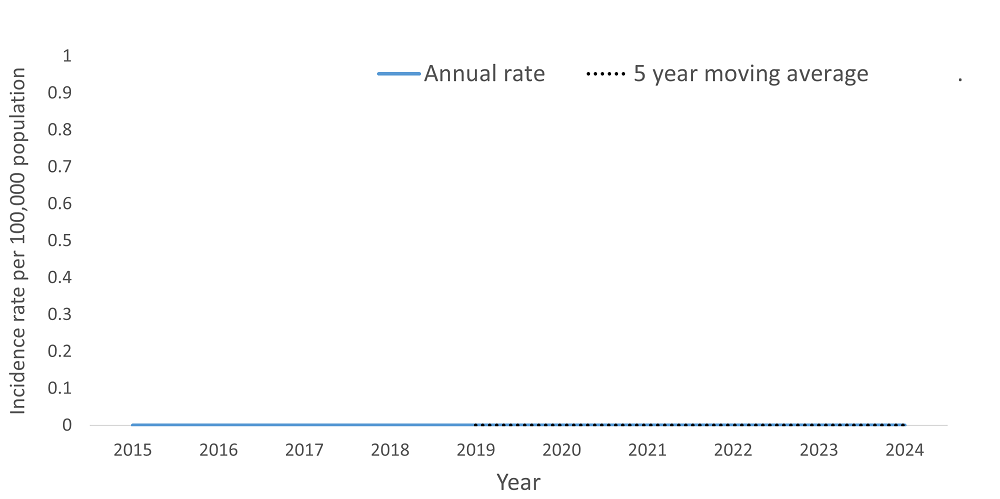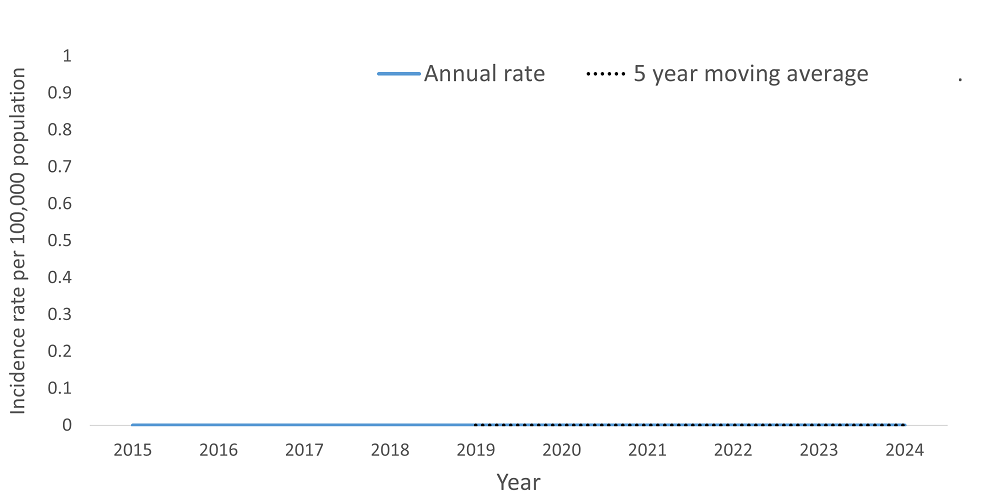Rubella, also known as German Measles, is a highly contagious disease caused by the rubella virus. It can be spread through direct contact (e.g., kissing an infected person, sharing food or drinks, or touching objects contaminated with the virus) or through the air when an infected person coughs, sneezes, or talks.
Rubella is very dangerous for pregnant individuals and unborn babies. A pregnant individual infected with rubella has a 90% chance of transmitting the disease to her unborn baby. However, it is rare for a woman who has been immunized to become infected with rubella. If the baby becomes infected, they can be born with congenital rubella syndrome (CRS), which can cause lifelong damage to the baby’s health. The baby can also spread the infection through urine, a runny nose, sneezing, and/or coughing. There is no treatment for CRS, but rubella is preventable by vaccination.
Local Information
2024 Statistics
Incidence rate is the number of new cases of disease divided by the number of persons at risk for the disease during a particular time period.
Cases:
0*
*Includes confirmed cases in 2024.
Incidence rate per 100,000 in 2024: 0
Incidence rate per 100,000 of Rubella by year

Cases:
0*
*Includes confirmed cases in 2024.
Incidence rate per 100,000 in 2024: 0
Incidence rate per 100,000 of Congenital Syndrome Rubella by year

Data Sources |
|
More information about rubella and congenital rubella syndrome |
|
Reporting |
|
Report to the Health Unit by next business day by phone at 705-474-1400 or toll free at 1-800-563-2808, ext. 5229 if rubella or congenital rubella syndrome is suspected or confirmed as per Ontario Regulation 135/18 and amendments under the Health Protection and Promotion Act, R.S.O., c.H.7. |
Should one go to childcare, school, or work if they have rubella? |
|
For rubella, exclude from work, school, childcare, and other activities for 7 days after the rash started. Avoid contact with pregnant individuals for 7 days after the rash started. For congenital rubella syndrome, infants should be isolated from non-immune pregnant individuals, infants, and children (those who are not up to date on rubella immunizations) until there are 2 sets of negative tests. Infants are considered contagious until there are 2 sets of negative tests. Follow the direction of your healthcare provider, public health case manager, or occupational health at your workplace. |
Vaccine Information |
|
Rubella is preventable by vaccination. Check your vaccination records or call the Vaccine Preventable Diseases program at 705-474-1400 or toll free at 1-800-563-2808, ext. 5252 to book a vaccination appointment or to obtain additional information. |
Healthcare Provider Information |
|
Public Health Agency of Canada - For Health Professionals: Rubella Public Health Agency of Canada - Rubella Vaccines: Canadian Immunization Guide Public Health Ontario: Rubella - Avidity Public Health Ontario: Rubella - Serology Public Health Ontario: Prenatal - Serology Public Health Ontario: Rubella - Diagnostic (Molecular Testing by RT-PCR) Public Health Ontario: Rubella and Congenital Rubella Syndrome (CRS) (German Measles) Infectious Disease Protocol, Appendix 1: Rubella Infectious Disease Protocol, Appendix 1: Rubella, congenital syndrome |
Contact our Communicable Disease Control (CDC) program at 705-474-1400 or toll free at 1-800-563-2808, ext. 5229, or by email to cdc@healthunit.ca for more information.
Last updated: February 2025, by CDC


